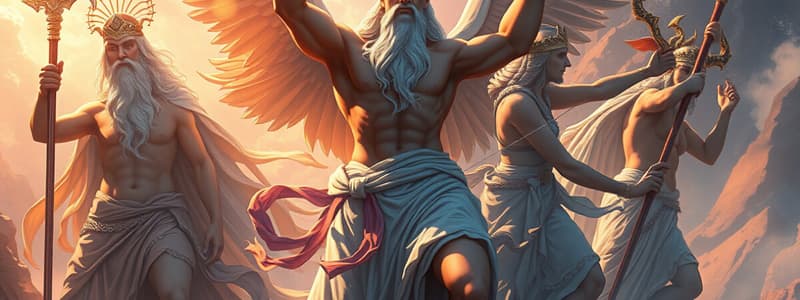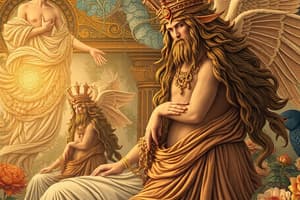Podcast
Questions and Answers
Which of the following are considered primal gods? (Select all that apply)
Which of the following are considered primal gods? (Select all that apply)
- Eros (correct)
- Hades
- Zeus
- Chaos (correct)
Who formed the first dynasty of gods?
Who formed the first dynasty of gods?
Uranus and Gaea
What are the children of Uranus and Gaea called?
What are the children of Uranus and Gaea called?
Titans
Who overthrew the Titan dynasty?
Who overthrew the Titan dynasty?
What is Zeus known as?
What is Zeus known as?
What animal is associated with Hera?
What animal is associated with Hera?
What is Poseidon the god of?
What is Poseidon the god of?
Who is Demeter's daughter?
Who is Demeter's daughter?
What is Hades known for?
What is Hades known for?
Who is Athena?
Who is Athena?
Aphrodite is the goddess of love and beauty.
Aphrodite is the goddess of love and beauty.
Who is the son of Zeus and Leto?
Who is the son of Zeus and Leto?
What does the term 'arete' mean?
What does the term 'arete' mean?
What is the significance of the grave circle A?
What is the significance of the grave circle A?
What is the relationship between Achilles and Patroclus?
What is the relationship between Achilles and Patroclus?
What is the purpose of the Linear B tablets?
What is the purpose of the Linear B tablets?
Who excavated Troy and Mycenae?
Who excavated Troy and Mycenae?
Match the following characters with their roles:
Match the following characters with their roles:
Flashcards are hidden until you start studying
Study Notes
Primal Gods
- Includes Chaos, Gaea, Tartarus, and Eros.
- Chaos birthed Night and Erebus, leading to Day and Aether.
First Dynasty of Gods
- Consisted of Uranus (Father Sky) and Gaea (Mother Earth).
Second Dynasty of Gods
- Comprised Cronus and Rhea, children of Uranus and Gaea.
- The Titans, their siblings, overthrew Uranus and Gaea.
Third Dynasty of Gods
- Known as Olympians, led by Zeus and Hera, who overthrew the Titans.
Zeus
- King of the gods; god of the sky and weather.
- Wields a thunderbolt, represents justice and kingship.
- Symbolizes order and hospitality; associated with the eagle.
Hera
- Queen and sister of Zeus; patron of marriage.
- Known for her jealousy; depicted in the Iliad supporting the Greeks.
- Associated animals: peacock and cow.
Poseidon
- Brother of Zeus; god of the sea and earthquakes.
- Creator of horses and father to numerous monsters.
- Wields a trident, supports the Greek side in the Iliad.
Demeter
- Sister of Zeus; goddess of agricultural fertility.
- Mother of Persephone, associated with grain.
Hestia
- Sister of Zeus; virgin goddess of the hearth.
- Represents home and family but appears less in myths.
Hades
- Brother of Zeus; ruler of the underworld.
- Married to Persephone; associated with the dead but not considered evil.
Persephone
- Daughter of Demeter; queen of the underworld and wife of Hades.
Athena
- Daughter of Zeus, born from his head; represents wisdom, war, and various arts.
- Virgin goddess associated with the owl; favors Greeks in the Iliad.
Aphrodite
- Goddess of love and beauty; born from the sea foam and Uranus's blood.
- Has a magical girdle, causing instant love; wife of Hephaestus.
Hephaestus
- Son of Zeus and Hera; god of fire and craftsmanship.
- Known as the lame blacksmith; creates armor for the gods.
Ares
- Son of Zeus and Hera; represents the chaos of war.
- Known for his violence and favored by Trojans.
Apollo
- Son of Zeus and Leto; god of prophecy, medicine, and music.
- Twin brother of Artemis; known for his beauty and skills in archery.
Artemis
- Daughter of Zeus and Leto; virgin goddess of the hunt and wild animals.
- Associated with the moon and childbirth; depicted as a huntress.
Hermes
- Son of Zeus and Maia; messenger of the gods.
- Guides souls to the underworld; embodies trickery, commerce, and travel.
Dionysus
- Son of Zeus and mortal Semele; god of wine and ecstasy.
- Considered the 13th Olympian; symbolizes chance and revelry.
Grave Circles A and B
- Grave Circle A (1600-1450 BC) contains richer graves with gold masks.
- Grave Circle B represents a transitional phase in Mycenaean burial practices.
Heinrich Schliemann
- German archaeologist known for excavating Troy and Mycenae.
- Based findings on Homeric descriptions.
Linear B and A Tablets
- Linear B: Mycenaean syllabic script used to record palace bureaucracies.
- Linear A is considered its predecessor, primarily found at Knossos in Crete.
Key Archaeological Sites
- Knossos: City in Crete, location of Linear B tablet discoveries.
- Pylos: Noted for frescoes influenced by Minoan culture.
- Mycenae: Features the iconic Lion's Gate and Cyclopean walls.
Significant Historical Figures
- Nestor: King of Pylos; experienced elder witness to heroic generations.
- Priam: King of Troy, father of numerous children including Hector.
- Menelaus: King of Sparta; husband of Helen, brother to Agamemnon.
Important Concepts Related to Ancient Greek Culture
- 'Time': Refers to honor; an essential value.
- 'Kleos': Means fame; recognition gained in life.
- 'Arete': Signifies virtue; excellence in action.
- 'Aristeia': Represents a moment of excellence within battle.
Epic Composition and Significance
- Epics are oral compositions recounting heroic deeds and significant events.
- Include themes of honor, glory, and the full breadth of cultural achievements.
Historical Eras in Ancient Greece
- Early Bronze Age: 3000-2000 BC.
- Middle Bronze Age: 2000-1600 BC; period of kingdom formation.
- Late Bronze Age: 1600-1100 BC; characterized as the Mycenaean Age.
- Dark Age: 1100-750 BC; followed the collapse of Mycenaean civilization.
Major Tomb Types in Mycenaean Culture
- Tholos Grave: Beehive-shaped tomb for elites; exquisite design.
- Chamber Tomb: Indicated highest status in society.
- Grave Types: Differentiated as pit graves (poor) and cist graves (middle-class).
Troys 6 vs. 7
- Examines archaeological evidence against poetic representation in the Iliad.
- Discusses the historicity of the Trojan War and Mycenaean Greek involvement.
Hittite Tablets
- Provide contextual evidence about the Mycenaean Greeks' interactions near Troy.
Studying That Suits You
Use AI to generate personalized quizzes and flashcards to suit your learning preferences.



